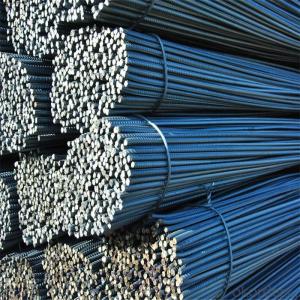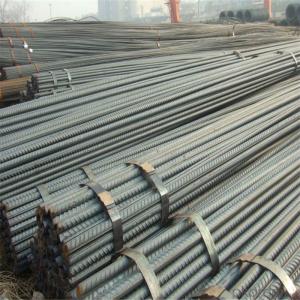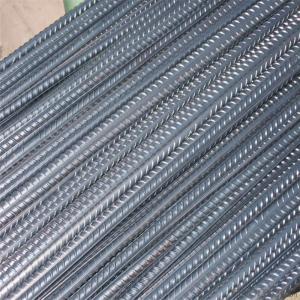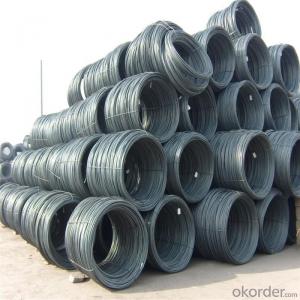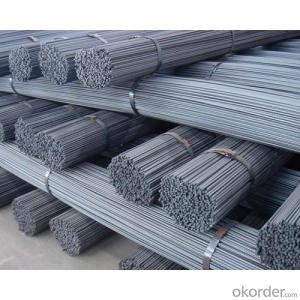Malaysia Steel Rebar Hrb400
- Loading Port:
- Tianjin
- Payment Terms:
- TT OR LC
- Min Order Qty:
- 110 m.t.
- Supply Capability:
- 500000 m.t./month
OKorder Service Pledge
OKorder Financial Service
You Might Also Like
Item specifice
Malaysia Steel Rebar Hrb400
Description of Malaysia Steel Rebar Hrb400
1, Diameter: 5.5mm-10mm Malaysia Steel Rebar Hrb400
10m- 40mm Malaysia Steel Rebar Hrb400
2, Length: 6m, 9m, 12m or customized
3, Standard: GB, ASTM, AISI, SAE, DIN, JIS, EN
OEM technology - send detailed technical parameters for accurate quotation.
2, Produce Process: smelt iron - EAF smelt billet - ESR smelt billet -
hot rolled or forged to get the steel round bar and plate
3, Heat Treatment: annealing, normalizing, tempering, quenching
4, Surface Treatment: Black
5, Quality Assurance: We accept third party inspection for all orders.
You can ask testing organizations such as SGS, BV, etc. to test our products before shipping.
Chemical Composition of Malaysia Steel Rebar Hrb400
Grade | Technical data of the original chemical composition(%) | |||||
Reinforcing steel bar HRB335 | C | Mn | Si | S | P | B |
≤0.25 | ≤1.60 | ≤0.80 | ≤0.045 | ≤0.045 | >0.0008 | |
Physics Capability | ||||||
Yield Strength(N/cm2) | Tensile Strength(N/cm2) | Elongation(%) | ||||
≥ 335 | ≥490 | ≥16 | ||||
Reinforcing steel bar HRB400 | C | Mn | Si | S | P | B |
≤0.25 | ≤0.16 | ≤0.80 | ≤0.045 | ≤0.045 | 0.04-0.12 | |
Physics Capability | ||||||
Yield Strength(N/cm2) | Tensile Strength(N/cm2) | Elongation(%) | ||||
≥ 400 | ≥ 570 | ≥ 14 | ||||
Products Show of Malaysia Steel Rebar Hrb400
Company Information
CNBM International Corporation is the most important trading platform of CNBM group.
Whith its advantages, CNBM International are mainly concentrate on Cement, Glass, Iron and Steel, Ceramics industries and devotes herself for supplying high qulity series of refractories as well as technical consultancies and logistics solutions.


F A Q
1, Your advantages?
professional products inquiry, products knowledge train (for agents), smooth goods delivery, excellent customer solution proposale
2, Test & Certificate?
SGS test is available, customer inspection before shipping is welcome, third party inspection is no problem
3, Factory or Trading Company?
CNBM is a trading company but we have so many protocol factories and CNBM works as a trading department of these factories. Also CNBM is the holding company of many factories.
4, Payment Terms?
30% TT as deposit and 70% before delivery.
Irrevocable L/C at sight.
5, Trading Terms?
EXW, FOB, CIF, FFR, CNF
6, After-sale Service?
CNBM provides the services and support you need for every step of our cooperation. We're the business partner you can trust.
For any problem, please kindly contact us at any your convenient time.
We'll reply you in our first priority within 24 hours.
- Q:What are the typical mechanical properties of special steel?
- The typical mechanical properties of special steel can vary depending on the specific grade and composition. However, some common characteristics include high tensile strength, good ductility, excellent hardness, and resistance to wear and corrosion. Special steels often exhibit superior toughness, heat resistance, and high fatigue strength, making them suitable for demanding applications in industries such as aerospace, automotive, and construction.
- Q:How is high-strength tool steel used in the production of heavy-duty tools?
- High-strength tool steel is used in the production of heavy-duty tools due to its exceptional hardness, strength, and durability. This type of steel is capable of withstanding high loads and intense usage, making it ideal for tools that require strength and resilience. Its superior properties enable the production of heavy-duty tools such as drills, hammers, saws, and wrenches that can endure rigorous tasks and provide long-lasting performance.
- Q:What are the standards and certifications for special steel?
- Some of the standards and certifications for special steel include ISO 9001 for quality management systems, ISO 14001 for environmental management systems, and ISO 45001 for occupational health and safety management systems. Additionally, there are various industry-specific standards such as ASTM International, EN standards, and JIS standards that provide specifications and testing requirements for different types of special steel. These standards and certifications ensure that the special steel meets specific quality, safety, and environmental standards, and helps to establish trust and credibility in the industry.
- Q:Can special steel be machined easily?
- No, special steel is typically harder and tougher than standard steel, making it more difficult to machine.
- Q:How is martensitic steel used in knife making?
- Martensitic steel is commonly used in knife making due to its high hardness and excellent edge retention properties. Its ability to be heat treated and tempered makes it ideal for creating sharp and durable knife blades. The steel's fine grain structure allows for precise and detailed work, resulting in high-quality and long-lasting knives.
- Q:What are the advantages of using special steel in various industries?
- There are several advantages of using special steel in various industries. Firstly, special steel possesses excellent strength and durability, making it suitable for applications that require high mechanical performance and resistance to wear and tear. Secondly, special steel offers superior corrosion resistance, which is crucial in industries exposed to harsh environments or corrosive substances. Additionally, special steel can be easily manipulated and molded into different shapes, enabling manufacturers to create complex and customized components. Lastly, special steel can withstand extreme temperatures, making it ideal for industries such as aerospace and automotive that operate in demanding conditions. Overall, the advantages of special steel contribute to improved product performance, longer lifespan, and increased operational efficiency in various industries.
- Q:How is nitrogen alloyed steel used in the production of high-strength bolts?
- Nitrogen alloyed steel is used in the production of high-strength bolts to enhance their mechanical properties. By adding nitrogen as an alloying element, the steel becomes stronger, more resistant to corrosion, and exhibits improved toughness. This makes the bolts suitable for applications requiring high levels of strength and durability, such as in construction, automotive, and aerospace industries.
- Q:How does special steel contribute to the aerospace fastener industry?
- Special steel contributes to the aerospace fastener industry by offering enhanced strength, durability, and resistance to extreme temperatures and corrosion. These properties make it a crucial material for manufacturing aerospace fasteners, which are essential for holding aircraft structures together. The high-performance nature of special steel ensures the reliability and safety of fasteners, ultimately contributing to the overall efficiency and success of the aerospace industry.
- Q:What are the challenges in welding special steel alloys?
- Welding special steel alloys presents various obstacles due to their distinct properties and composition. Key challenges encountered when welding special steel alloys include the following: 1. Elevated melting point: Special steel alloys typically possess higher melting points compared to regular steel, necessitating increased heat input during the welding process. This can create difficulties in achieving proper fusion and may require specialized welding equipment and techniques. 2. Disparity in thermal expansion: Special steel alloys may exhibit different coefficients of thermal expansion in comparison to the base metal or other materials being joined. This can result in the development of stress and distortion during welding, impacting the structural integrity of the welded joints. 3. Heat sensitivity: Certain special steel alloys are more susceptible to heat-affected zone (HAZ) cracking and other forms of weld defects. The heightened heat input during welding can induce the formation of brittle phases or precipitates, leading to reduced mechanical properties and potential weld failures. 4. Metallurgical alterations: Welding special steel alloys can bring about significant metallurgical changes in the base metal and the heat-affected zone. These changes encompass the formation of new microstructures, variations in hardness, and modifications in chemical composition. Such alterations can affect the overall performance and properties of the welded joints. 5. Pre-weld and post-weld treatments: Specific pre-weld and post-weld treatments are often required for special steel alloys to minimize the risk of weld defects and optimize the properties of the welded joints. These treatments may encompass preheating, post-weld heat treatment, or the utilization of specialized filler metals to ensure adequate weld integrity. 6. Limited consumable availability: Special steel alloys may have a limited selection of suitable consumables, such as filler metals and shielding gases, which are vital for achieving high-quality welds. The absence of appropriate consumables can make it challenging to find compatible materials that offer sufficient strength and corrosion resistance in the welded joints. To overcome these challenges effectively, it is essential to possess a comprehensive understanding of the specific properties and requirements of the special steel alloy being welded. The utilization of proper welding techniques, including heat control, filler material selection, and post-weld treatments, is crucial to ensure welds of superior quality with optimal mechanical properties and structural integrity. Moreover, collaborating with material suppliers, welding experts, and adhering to industry standards and guidelines can facilitate the effective resolution of challenges associated with welding special steel alloys.
- Q:How does special steel perform in cryogenic gas environments?
- Special steel performs well in cryogenic gas environments due to its unique properties. It has excellent resistance to low temperatures and maintains its strength and toughness even at extremely cold temperatures. This makes it highly suitable for applications in cryogenic gas environments where traditional steel may become brittle or lose its strength. Additionally, special steel's resistance to corrosion and thermal expansion further enhances its performance in these extreme conditions.
1. Manufacturer Overview |
|
|---|---|
| Location | |
| Year Established | |
| Annual Output Value | |
| Main Markets | |
| Company Certifications | |
2. Manufacturer Certificates |
|
|---|---|
| a) Certification Name | |
| Range | |
| Reference | |
| Validity Period | |
3. Manufacturer Capability |
|
|---|---|
| a)Trade Capacity | |
| Nearest Port | |
| Export Percentage | |
| No.of Employees in Trade Department | |
| Language Spoken: | |
| b)Factory Information | |
| Factory Size: | |
| No. of Production Lines | |
| Contract Manufacturing | |
| Product Price Range | |
Send your message to us
Malaysia Steel Rebar Hrb400
- Loading Port:
- Tianjin
- Payment Terms:
- TT OR LC
- Min Order Qty:
- 110 m.t.
- Supply Capability:
- 500000 m.t./month
OKorder Service Pledge
OKorder Financial Service
Similar products
New products
Hot products
Hot Searches
Related keywords
